Cleft-chinned and steely-eyed American superstar Kirk Douglas (1916) passed away on 5 February 2020 in Los Angeles, at the age of 103. The legendary actor, producer and director made his film debut in The Strange Love of Martha Ivers (1946) with Barbara Stanwyck. Douglas soon developed into a leading box-office star throughout the 1950s, known for serious dramas, Westerns and war films. Our favourites are the two classics he made with Stanley Kubrick, Paths of Glory (1957) and Spartacus (1960). During his long career, he appeared in more than 90 films. Mr. Douglas, rest in peace, EFSP salutes you.
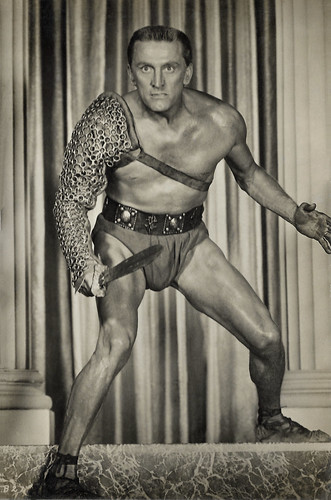
Spanish postcard by Archivo Bermejo, no. 7143. Photo: Universal International, 1960. Kirk Douglas in Spartacus (Stanley Kubrick, 1960).
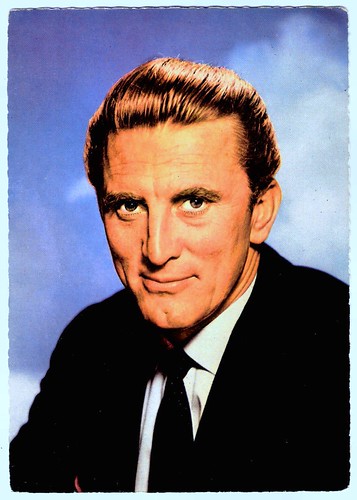
German postcard by ISV, no. A 42. Photo: 20th Century Fox. Publicity still for The Racers (Henry Hathaway, 1955).
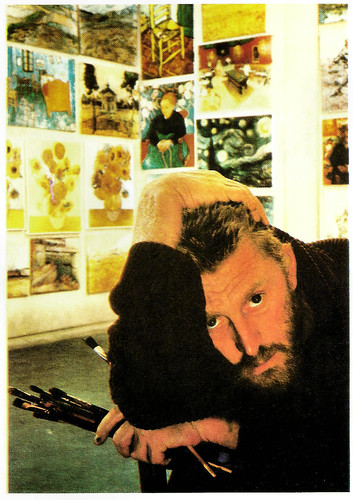
French postcard in the Collection Cinema Couleur by Editions La Malibran, Paris/Nancy, 1989. Photo: John Bryson. Publicity still for Lust for Life (Vincente Minnelli, 1956).
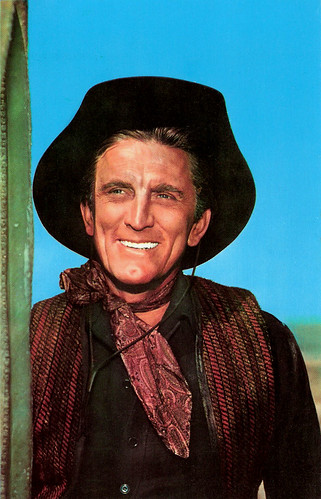
Israelian postcard by Editions de Luxe. Photo: publicity still for The Last Sunset (Robert Aldrich, 1961).

Italian postcard in the Artisti di Sempre series by Rotalfoto, Milano, no. 297.
Kirk Douglas was born as 'the ragman's son' (the name of his 1988 autobiography) known as Issur Danielovitch Demsky, in Amsterdam, New York, in 1916. His parents, Bryna (Sanglel) and Herschel Danielovitch were Jewish immigrants from Chavusy, Mahilyow Voblast (now in Belarus). Kirk had six sisters.
Growing up in a poor ghetto, 'Izzy' Demsky sold snacks to mill workers and delivered newspapers to earn enough to buy milk and bread to help his family. He was a fine student and wrestled competitively during his time at St. Lawrence University.
He worked at more than forty different jobs before getting an acting job. The American Academy of Dramatic Arts gave him a special scholarship, but he only appeared in a handful of minor Broadway productions before joining the US Navy in 1941. He then legally changed his name to Kirk Douglas.
After the war, Douglas returned to New York City and found work in radio, theatre and commercials. His stage break occurred in Kiss and Tell, which led to other roles. On the insistence of ex-classmate Lauren Bacall producer Hal B. Wallis screen-tested Douglas and cast him opposite Barbara Stanwyck in The Strange Love of Martha Ivers (Lewis Milestone, 1946). He played a young, insecure man, stung with jealousy, whose life was dominated by a ruthless older woman, and he hid his feelings with alcohol. It would be the last time that Douglas portrayed a weakling in a film role.
His performance received rave reviews and further work quickly followed, including an appearance in the Film Noir I Walk Alone (Byron Haskin, 1948). It was the first time he worked alongside Burt Lancaster. They appeared in seven films together, including the dynamic western Gunfight at the O.K. Corral (John Sturges, 1957), the John Frankenheimer political thriller Seven Days in May (1964) and their final pairing in the gangster comedy Tough Guys (Jeff Kanew, 1986).
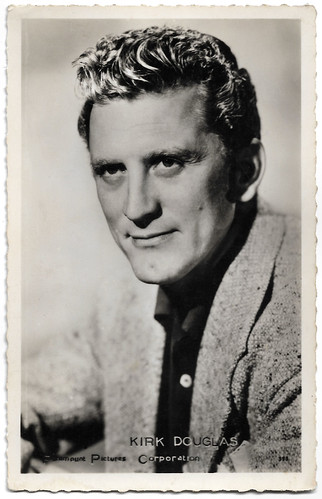
French postcard by Editions P.I., Paris, no. 393. Photo: Paramount Pictures Corporation.
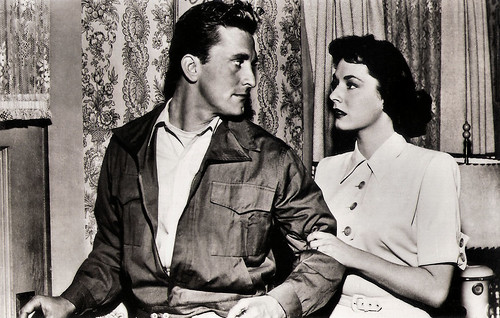
Spanish postcard by Soberanas, no. 280. Photo: publicity still for Champion (Mark Robson, 1949) with Ruth Roman.

Dutch card. Photo: Warner Bros. Doris Day and Kirk Douglas in Young Man with a Horn (Michael Curtiz, 1950).

Spanish postcard by JDP, Valencia, no. 1375. Photo: Kirk Douglas and Eleanor Parker in Detective Story (William Wyler, 1951).
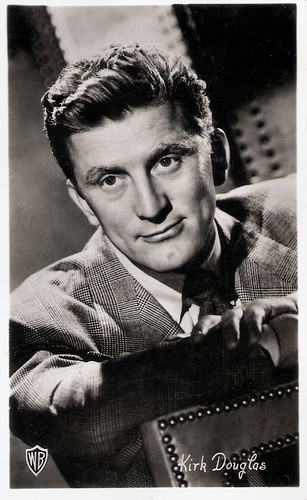
Belgian collectors card by De Beukelaer, Antwerp, no A 43. Photo: Warner Bros.
Douglas scored his first Oscar nomination playing the tough, unscrupulous boxing hero Midge Kelly in the gripping The Champion (Mark Robson, 1949). His acting style, relying on expressing great concentration, realism, and powerful emotions, made him a star. Among his early films were the musical drama Young Man with a Horn (Michael Curtiz, 1950) opposite Lauren Bacall, Billy Wilder's Film Noir on the Press, Ace in the Hole (1951) which won a Best Foreign Film award at the Venice Film Festival, and the Film Noir Detective Story (William Wyler, 1951), nominated for four Academy Awards.
The quality of his work continued to garner the attention of critics. He was again nominated for an Oscar for his role as a film producer in The Bad and the Beautiful (Vincente Minnelli, 1952) opposite Lana Turner. Douglas plays a hard-nosed film producer who manipulates and uses his actors, writers, and directors. The film won five Academy Awards out of six nominations. Douglas showed a lighter, comic touch in 20,000 Leagues Under the Sea (Richard Fleischer, 1954). In this adaptation of Jules Verne's 19th-century novel, he played a happy-go-lucky sailor who was the opposite in every way to the brooding Captain Nemo (James Mason). The film was one of Walt Disney's most successful live-action films, won two minor Oscars and was a major box-office hit.
He got another Oscar nomination for his portrayal of Dutch painter Vincent van Gogh in Lust for Life (Vincente Minnelli, 1956), based on Irving Stone's best-seller and filmed in France. Douglas was noted not only for the veracity of van Gogh's appearance but also for how he conveyed the painter's massive creative power and his tortured soul. His moving and memorable Van Gogh is considered one of his finest roles. Douglas won a Golden Globe award.
Douglas demonstrated his independent streak and broke his contracts with Hal Wallis and Warner Brothers to gain total control over his projects. In Italy, he made the successful Ulisse/Ulyssus (Mario Camerini, 1954) an adaptation of Homer's second epic, that describes Ulysses' efforts to return to his home after the end of ten years of war. Douglas formed his own film company, Bryna Productions, named after his mother. The company was behind two pivotal film roles in his career. The first was as French army officer Colonel Dax in then relatively unknown director Stanley Kubrick's brilliant anti-war epic Paths of Glory (1957). During World War I, Dax tries to save three soldiers from the firing squad. While Paths of Glory did not do well at the box office, it has since become one of the great anti-war films.
Douglas reunited with Kubrick for yet another epic, the magnificent Spartacus (Stanley Kubrick, 1960). The film also marked a key turning point in the life of screenwriter Dalton Trumbo, who had been blacklisted during the McCarthy communist witch hunt in the 1950s. At Douglas' insistence, Trumbo was given on-screen credit for his contributions. This began the dissolution of the infamous blacklisting policies begun almost a decade previously that had destroyed so many careers and lives. However, Trumbo's family later claimed that Douglas overstated his role.
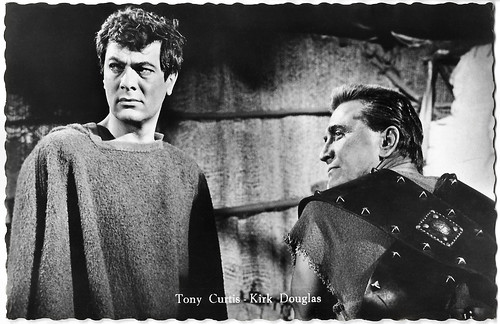
Dutch postcard, no. 1160. Photo: Universal International. Tony Curtis and Kirk Douglas in Spartacus (Stanley Kubrick, 1960).
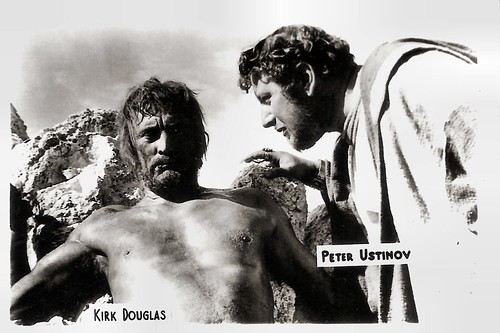
Romanian collectors card. Photo: publicity still for Spartacus (Stanley Kubrick, 1960) with Peter Ustinov.
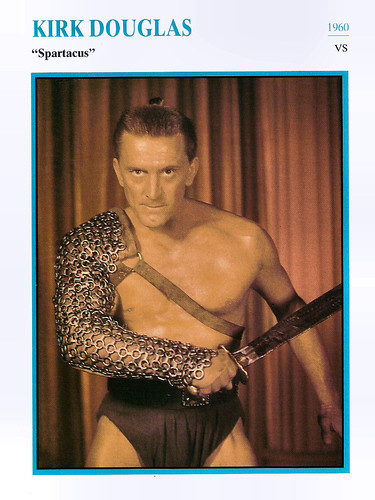
Dutch collectors card in the series 'Filmsterren: een Portret' by Edito Service, 1994. Photo: Collection Christophe L. Kirk Douglas in Spartacus (Stanley Kubrick, 1960)

Romanian postcard by Casa Filmului Acin, no. 40. Kirk Douglas and Ulla Jacobsson in The Heroes of Telemark (Anthony Mann, 1965).
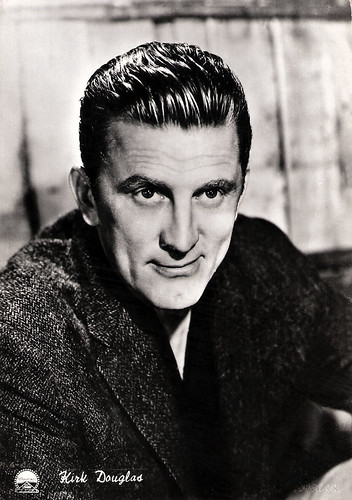
Italian postcard by Bromofoto, Milano, no. 1268. Photo: Paramount Films.
Douglas remained busy throughout the 1960s, starring in many films. He produced and starred as a rebellious modern-day cowboy in Lonely Are the Brave (David Miller, 1962), considered a cult classic. He acted in the mystery The List of Adrian Messenger (John Huston, 1963), alongside John Wayne in the World War II story In Harm's Way (Otto Preminger, 1965), and in the tongue-in-cheek Western The War Wagon (Burt Kennedy, 1967).
On stage, he starred in 1963 in the Broadway production of Ken Kesey's One Flew Over The Cuckoo's Nest. He bought the film rights, but no Hollywood studio could be convinced to bring the story to the screen. Kirk's son Michael Douglas finally filmed the tale, One Flew Over The Cuckoo's Nest (Milos Forman, 1975), starring Jack Nicholson. The film won all five major Academy Awards (Best Picture, Actor in Lead Role, Actress in Lead Role, Director, and Screenplay).
Although Douglas wasn't as busy as in previous years, he made nearly 40 films and appeared on various television shows between 1970 and 2008. In 1970, he starred in the Western There Was a Crooked Man... (Joseph L. Mankiewicz, 1970) alongside Henry Fonda. In 1973, he directed his first film, Scalawag. In 1978, he starred with John Cassavetes and Amy Irving in the excellent horror film The Fury, directed by Brian De Palma. In 1980, he starred in The Final Countdown (Don Taylor, 1980), playing the commanding officer of the aircraft carrier USS Nimitz, which travels through time to the day before the 1941 attack on Pearl Harbor. It was produced by his son Peter Douglas.
His other films included the Western comedy The Villain (Hal Needham, 1979) with Arnold Schwarzenegger, the Sci-fi thriller Saturn 3 (Stanley Donen, 1980) and the Australian Western The Man from Snowy River (George Miller, 1982), which received a fair degree of critical acclaim and was the most popular Australian film of all time until Crocodile Dundee (Peter Faiman, 1986). In 1986, he also reunited with his longtime costar Burt Lancaster in the crime comedy Tough Guys (Jeff Kanew, 1986), with Eli Wallach. Less known are his roles in such European films as Un uomo da rispettare/The Master Touch (Michele Lupo, 1972) with Giuliano Gemma, and Veraz (Xavier Castano, 1991).
Douglas has long been involved in humanitarian causes and has been a Goodwill Ambassador for the US State Department since 1963. France honoured him with the Chevalier of the Legion of Honour. He was presented with an honorary Academy Award by Steven Spielberg in 1996. Despite a helicopter crash and a stroke suffered in the 1990s, Douglas focused on renewing his spiritual and religious life. He underwent years of voice therapy and made the film Diamonds (John Mallory Asher, 1999), in which he played an old prizefighter who was recovering from a stroke. It costarred his longtime friend from his early years, Lauren Bacall.
Kirk Douglas was the last surviving superstar from the Golden Age of Hollywood. He lived with Belgium-born producer Anne Buydens, his wife of over 60 years. They had two children, television and film producer Peter Douglas (1955) and actor and stand-up comedian Eric Douglas. In 2004, Eric died of an accidental drug overdose at the age of 46. With his first wife, Bermudian actress Diana Dill, Kirk Douglas also has two children, Michael Douglas (1944) and Joel Douglas (1947). In 2003, Michael and Joel produced It Runs in the Family (Fred Schepisi, 2003), in which Kirk starred with Michael, Michael's son Cameron Douglas, and Diana Dill, playing his wife. His most recent film appearance was in a strong non-speaking role in Meurtres à l'Empire State Building (William Karel, 2008), a French tribute and doc-crime-drama celebrating American Film Noir and the icons of the Hollywood golden age.
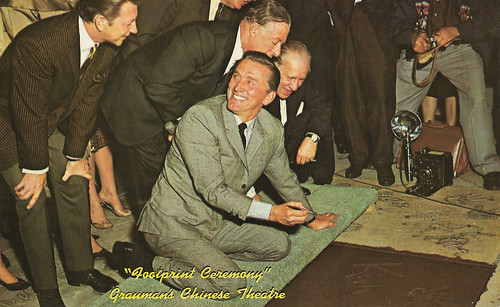
American postcard by Colourpicture, Boston, Mass., no. P51738. Caption: Grauman's Chinese Theatre, Hollywood, California. In the wet cement of the world-famous forecourt, Mr Kirk Douglas becomes a movie immortal as a crowd including Donald O'Connor and George Jessel looks on.

Spanish postcard by Postal Oscarcolor.
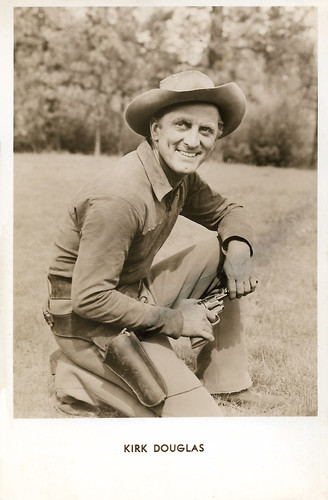
Belgian postcard, no. 5348.
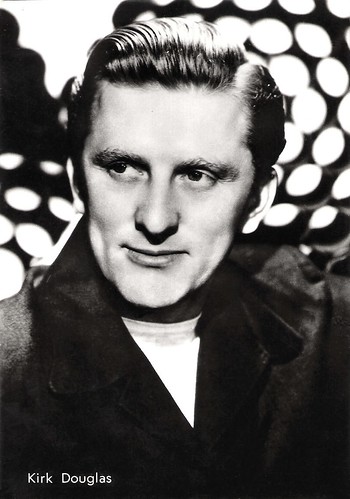
Italian postcard by Bromostampa, Milano, no. 55.
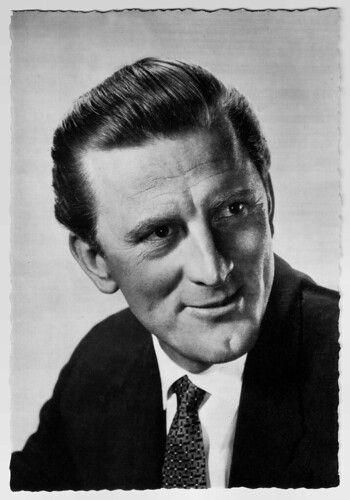
German postcard by WS-Druck, Wanne-Eickel, no. 253. Photo: Centfox.

East-German postcard by Progress Film-Verleih, Berlin, no. 15/80. Photo: Günter Linke, 1979.
Trailer Ulysses (1954). Source: junkiefix (YouTube).
Trailer Spartacus (1960). Source: Movieclips Trailer Vault (YouTube).
Sources: firehouse44 (IMDb), Pedro Borges (IMDb), Ella Alexander (The Independent), Wikipedia and IMDb.
This post was last updated on 24 January 2024.

Spanish postcard by Archivo Bermejo, no. 7143. Photo: Universal International, 1960. Kirk Douglas in Spartacus (Stanley Kubrick, 1960).

German postcard by ISV, no. A 42. Photo: 20th Century Fox. Publicity still for The Racers (Henry Hathaway, 1955).

French postcard in the Collection Cinema Couleur by Editions La Malibran, Paris/Nancy, 1989. Photo: John Bryson. Publicity still for Lust for Life (Vincente Minnelli, 1956).

Israelian postcard by Editions de Luxe. Photo: publicity still for The Last Sunset (Robert Aldrich, 1961).

Italian postcard in the Artisti di Sempre series by Rotalfoto, Milano, no. 297.
The ragman's son
Kirk Douglas was born as 'the ragman's son' (the name of his 1988 autobiography) known as Issur Danielovitch Demsky, in Amsterdam, New York, in 1916. His parents, Bryna (Sanglel) and Herschel Danielovitch were Jewish immigrants from Chavusy, Mahilyow Voblast (now in Belarus). Kirk had six sisters.
Growing up in a poor ghetto, 'Izzy' Demsky sold snacks to mill workers and delivered newspapers to earn enough to buy milk and bread to help his family. He was a fine student and wrestled competitively during his time at St. Lawrence University.
He worked at more than forty different jobs before getting an acting job. The American Academy of Dramatic Arts gave him a special scholarship, but he only appeared in a handful of minor Broadway productions before joining the US Navy in 1941. He then legally changed his name to Kirk Douglas.
After the war, Douglas returned to New York City and found work in radio, theatre and commercials. His stage break occurred in Kiss and Tell, which led to other roles. On the insistence of ex-classmate Lauren Bacall producer Hal B. Wallis screen-tested Douglas and cast him opposite Barbara Stanwyck in The Strange Love of Martha Ivers (Lewis Milestone, 1946). He played a young, insecure man, stung with jealousy, whose life was dominated by a ruthless older woman, and he hid his feelings with alcohol. It would be the last time that Douglas portrayed a weakling in a film role.
His performance received rave reviews and further work quickly followed, including an appearance in the Film Noir I Walk Alone (Byron Haskin, 1948). It was the first time he worked alongside Burt Lancaster. They appeared in seven films together, including the dynamic western Gunfight at the O.K. Corral (John Sturges, 1957), the John Frankenheimer political thriller Seven Days in May (1964) and their final pairing in the gangster comedy Tough Guys (Jeff Kanew, 1986).

French postcard by Editions P.I., Paris, no. 393. Photo: Paramount Pictures Corporation.

Spanish postcard by Soberanas, no. 280. Photo: publicity still for Champion (Mark Robson, 1949) with Ruth Roman.

Dutch card. Photo: Warner Bros. Doris Day and Kirk Douglas in Young Man with a Horn (Michael Curtiz, 1950).

Spanish postcard by JDP, Valencia, no. 1375. Photo: Kirk Douglas and Eleanor Parker in Detective Story (William Wyler, 1951).

Belgian collectors card by De Beukelaer, Antwerp, no A 43. Photo: Warner Bros.
Vincent van Gogh
Douglas scored his first Oscar nomination playing the tough, unscrupulous boxing hero Midge Kelly in the gripping The Champion (Mark Robson, 1949). His acting style, relying on expressing great concentration, realism, and powerful emotions, made him a star. Among his early films were the musical drama Young Man with a Horn (Michael Curtiz, 1950) opposite Lauren Bacall, Billy Wilder's Film Noir on the Press, Ace in the Hole (1951) which won a Best Foreign Film award at the Venice Film Festival, and the Film Noir Detective Story (William Wyler, 1951), nominated for four Academy Awards.
The quality of his work continued to garner the attention of critics. He was again nominated for an Oscar for his role as a film producer in The Bad and the Beautiful (Vincente Minnelli, 1952) opposite Lana Turner. Douglas plays a hard-nosed film producer who manipulates and uses his actors, writers, and directors. The film won five Academy Awards out of six nominations. Douglas showed a lighter, comic touch in 20,000 Leagues Under the Sea (Richard Fleischer, 1954). In this adaptation of Jules Verne's 19th-century novel, he played a happy-go-lucky sailor who was the opposite in every way to the brooding Captain Nemo (James Mason). The film was one of Walt Disney's most successful live-action films, won two minor Oscars and was a major box-office hit.
He got another Oscar nomination for his portrayal of Dutch painter Vincent van Gogh in Lust for Life (Vincente Minnelli, 1956), based on Irving Stone's best-seller and filmed in France. Douglas was noted not only for the veracity of van Gogh's appearance but also for how he conveyed the painter's massive creative power and his tortured soul. His moving and memorable Van Gogh is considered one of his finest roles. Douglas won a Golden Globe award.
Douglas demonstrated his independent streak and broke his contracts with Hal Wallis and Warner Brothers to gain total control over his projects. In Italy, he made the successful Ulisse/Ulyssus (Mario Camerini, 1954) an adaptation of Homer's second epic, that describes Ulysses' efforts to return to his home after the end of ten years of war. Douglas formed his own film company, Bryna Productions, named after his mother. The company was behind two pivotal film roles in his career. The first was as French army officer Colonel Dax in then relatively unknown director Stanley Kubrick's brilliant anti-war epic Paths of Glory (1957). During World War I, Dax tries to save three soldiers from the firing squad. While Paths of Glory did not do well at the box office, it has since become one of the great anti-war films.
Douglas reunited with Kubrick for yet another epic, the magnificent Spartacus (Stanley Kubrick, 1960). The film also marked a key turning point in the life of screenwriter Dalton Trumbo, who had been blacklisted during the McCarthy communist witch hunt in the 1950s. At Douglas' insistence, Trumbo was given on-screen credit for his contributions. This began the dissolution of the infamous blacklisting policies begun almost a decade previously that had destroyed so many careers and lives. However, Trumbo's family later claimed that Douglas overstated his role.

Dutch postcard, no. 1160. Photo: Universal International. Tony Curtis and Kirk Douglas in Spartacus (Stanley Kubrick, 1960).

Romanian collectors card. Photo: publicity still for Spartacus (Stanley Kubrick, 1960) with Peter Ustinov.

Dutch collectors card in the series 'Filmsterren: een Portret' by Edito Service, 1994. Photo: Collection Christophe L. Kirk Douglas in Spartacus (Stanley Kubrick, 1960)

Romanian postcard by Casa Filmului Acin, no. 40. Kirk Douglas and Ulla Jacobsson in The Heroes of Telemark (Anthony Mann, 1965).

Italian postcard by Bromofoto, Milano, no. 1268. Photo: Paramount Films.
It runs in the family
Douglas remained busy throughout the 1960s, starring in many films. He produced and starred as a rebellious modern-day cowboy in Lonely Are the Brave (David Miller, 1962), considered a cult classic. He acted in the mystery The List of Adrian Messenger (John Huston, 1963), alongside John Wayne in the World War II story In Harm's Way (Otto Preminger, 1965), and in the tongue-in-cheek Western The War Wagon (Burt Kennedy, 1967).
On stage, he starred in 1963 in the Broadway production of Ken Kesey's One Flew Over The Cuckoo's Nest. He bought the film rights, but no Hollywood studio could be convinced to bring the story to the screen. Kirk's son Michael Douglas finally filmed the tale, One Flew Over The Cuckoo's Nest (Milos Forman, 1975), starring Jack Nicholson. The film won all five major Academy Awards (Best Picture, Actor in Lead Role, Actress in Lead Role, Director, and Screenplay).
Although Douglas wasn't as busy as in previous years, he made nearly 40 films and appeared on various television shows between 1970 and 2008. In 1970, he starred in the Western There Was a Crooked Man... (Joseph L. Mankiewicz, 1970) alongside Henry Fonda. In 1973, he directed his first film, Scalawag. In 1978, he starred with John Cassavetes and Amy Irving in the excellent horror film The Fury, directed by Brian De Palma. In 1980, he starred in The Final Countdown (Don Taylor, 1980), playing the commanding officer of the aircraft carrier USS Nimitz, which travels through time to the day before the 1941 attack on Pearl Harbor. It was produced by his son Peter Douglas.
His other films included the Western comedy The Villain (Hal Needham, 1979) with Arnold Schwarzenegger, the Sci-fi thriller Saturn 3 (Stanley Donen, 1980) and the Australian Western The Man from Snowy River (George Miller, 1982), which received a fair degree of critical acclaim and was the most popular Australian film of all time until Crocodile Dundee (Peter Faiman, 1986). In 1986, he also reunited with his longtime costar Burt Lancaster in the crime comedy Tough Guys (Jeff Kanew, 1986), with Eli Wallach. Less known are his roles in such European films as Un uomo da rispettare/The Master Touch (Michele Lupo, 1972) with Giuliano Gemma, and Veraz (Xavier Castano, 1991).
Douglas has long been involved in humanitarian causes and has been a Goodwill Ambassador for the US State Department since 1963. France honoured him with the Chevalier of the Legion of Honour. He was presented with an honorary Academy Award by Steven Spielberg in 1996. Despite a helicopter crash and a stroke suffered in the 1990s, Douglas focused on renewing his spiritual and religious life. He underwent years of voice therapy and made the film Diamonds (John Mallory Asher, 1999), in which he played an old prizefighter who was recovering from a stroke. It costarred his longtime friend from his early years, Lauren Bacall.
Kirk Douglas was the last surviving superstar from the Golden Age of Hollywood. He lived with Belgium-born producer Anne Buydens, his wife of over 60 years. They had two children, television and film producer Peter Douglas (1955) and actor and stand-up comedian Eric Douglas. In 2004, Eric died of an accidental drug overdose at the age of 46. With his first wife, Bermudian actress Diana Dill, Kirk Douglas also has two children, Michael Douglas (1944) and Joel Douglas (1947). In 2003, Michael and Joel produced It Runs in the Family (Fred Schepisi, 2003), in which Kirk starred with Michael, Michael's son Cameron Douglas, and Diana Dill, playing his wife. His most recent film appearance was in a strong non-speaking role in Meurtres à l'Empire State Building (William Karel, 2008), a French tribute and doc-crime-drama celebrating American Film Noir and the icons of the Hollywood golden age.

American postcard by Colourpicture, Boston, Mass., no. P51738. Caption: Grauman's Chinese Theatre, Hollywood, California. In the wet cement of the world-famous forecourt, Mr Kirk Douglas becomes a movie immortal as a crowd including Donald O'Connor and George Jessel looks on.

Spanish postcard by Postal Oscarcolor.

Belgian postcard, no. 5348.

Italian postcard by Bromostampa, Milano, no. 55.

German postcard by WS-Druck, Wanne-Eickel, no. 253. Photo: Centfox.

East-German postcard by Progress Film-Verleih, Berlin, no. 15/80. Photo: Günter Linke, 1979.
Trailer Ulysses (1954). Source: junkiefix (YouTube).
Trailer Spartacus (1960). Source: Movieclips Trailer Vault (YouTube).
Sources: firehouse44 (IMDb), Pedro Borges (IMDb), Ella Alexander (The Independent), Wikipedia and IMDb.
This post was last updated on 24 January 2024.
1 comment:
Paul, I loved Kirk Douglas--he was a talented actor and worked hard at his craft. These postcards are wonderful!
I have a 26 yr-old son. It is a strange thing to have children so "old." My eldest is over 30! LOL
Have a wonderful weekend!
Post a Comment